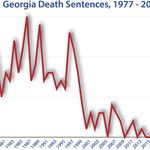
State & Federal
Georgia

History of the Death Penalty
Georgia has employed capital punishment since colonial times, with executions recorded at least as early as 1735. Crimes punishable by capital punishment in Georgia have historically included murder, robbery, rape, horse stealing, and aiding a runaway slave. Up until the 1920s executions were generally carried out by hanging, although the condemned were sometimes executed by firing squad and at least two were burned at the stake. The first Georgia execution to utilize the electric chair was carried out in 1924. Electrocution quickly supplanted hanging as the state’s primary execution method, although hanging was still used intermittently until 1931. Electrocution remained the primary method of execution until October 5th, 2001 when the Georgia Supreme Court declared the practice unconstitutional as cruel and unusual punishment, after which Georgia converted to using lethal injection. Before 1976, Georgia carried out 950 executions, the fourth-highest number of any state.
Timeline
1735 – First known execution in Georgia, Alice Riley hung for murder.
1816 – Georgia statute defines the following as capital crimes when committed by a slave or a free person of color: poisoning or attempted poisoning; insurrection or attempted insurrection; rape or attempted rape of a white female; assaulting a white person with a deadly weapon or with intent to murder; maiming a white person; and burglary.
1829 – Georgia passes a law making it a capital crime for white persons to introduce into Georgia, or circulate in Georgia, any publication for the purpose of inciting a revolt among the slaves.
1863 – Georgia statute makes white persons subject to the death penalty if they incite an insurrection or revolt of slaves, or attempt to do so.
1865 – Race-based death penalty statutes eliminated in Georgia.
1924 – Henson Howard, a black man, is the first person electrocuted by the state of Georgia. He was executed for rape and robbery.
1931 – Electrocution completely replaces hanging as Georgia’s execution method.
1972 – The Supreme Court strikes down the death penalty in Furman v. Georgia, declaring all existing death penalty statutes unconstitutional.
1973 – Georgia passes a new capital punishment statute.
1976 – The Supreme Court decides reaffirms the constitutionality of capital punishment and upholds Georgia’s death penalty statute in Gregg v. Georgia.
1977 – The Supreme Court rules in the case of Coker v. Georgia that the use of the death penalty for crimes like rape or robbery in which a victim is not killed is unconstitutional.
1980 – The Supreme Court rules that the portion of Georgia’s death penalty statute allowing for the death penalty for murders that are “outrageously or wantonly vile, horrible or inhuman” is unconstitutionally vague.
1986 – The Supreme Court decides the case of McCleskey v. Kemp, holding that statistical evidence of race discrimination in Georgia’s death penalty system was not enough to overturn the defendant’s sentence.
1991 – Gary Nelson, a death row inmate, is exonerated of the rape and murder of a young girl. It was revealed that prosecutors had withheld evidence of Nelson’s innocence.
2001 – The Georgia Supreme Court finds electrocution unconstitutional. Georgia begins using lethal injection as its method of execution.
2005 — Lena Baker is posthumously pardoned 60 years after being executed in Georgia’s electric chair. Ms. Barker was convicted by a jury of all white men after a one-day trial for killing her white employer and long-time sexual abuser in self defense.
2008 — The Georgia State Senate overwhelmingly rejects a proposal that would allow non-unanimous jury sentencing verdicts in capital cases.
2011 — Roy Blankenship is the first person put to death in Georgia using pentobarbital as the sedative in the three-drug lethal injection execution process.
2013 — Timothy Johnson is acquitted of murder charges and released from prison 29 years after being sentenced.
2014 — The Georgia Supreme Court upholds Georgia’s law that hides the source and identity of the preparer of drugs and equipment used in executions.
2015 — Kelly Renee Gissendaner is executed after planning her husband’s murder at the hands of someone else. She was the first female executed in Georgia in 70 years.
2016 – The U.S. Supreme Court overturns the conviction and death sentence of Timothy Foster, ruling that prosecutors unconstitutionally exercised their discretionary jury challenges to strike jurors because they were black. Foster, a black man, was sentenced to death by an all-white jury after prosecutors removed every black prospective juror from the jury pool.
2021 — The Georgia Supreme Court denies a constitutional challenge to the state’s statutory requirement that a capital defendant must prove beyond a reasonable doubt that he or she is intellectually disabled before being declared ineligible for the death penalty.
2022 — The Supreme Court affirms the practice of using federal civil rights suit to challenge state execution methods. This decision rejects Georgia’s contention that such challenges must be brought in federal habeas corpus proceedings when the death row prisoner proposes an alternative execution method.
Famous Cases
Furman v. Georgia (1972): William Furman was caught by homeowner William Micke while attempting to burgle Micke’s home. In his escape attempt Furman claims that he fired his gun blindly behind him and accidentally killed Micke. Furman was convicted of felony murder largely on the basis of his own statement to police, and subsequently sentenced to death. Furman’s lawyers appealed all the way to the U.S. Supreme Court after the highest courts in Georgia upheld the conviction. In 9 separate opinions, and by a vote of 5 to 4, the Court held that Georgia’s death penalty statute, which gave the jury nearly complete sentencing discretion, could result in arbitrary sentencing. The Court held that the scheme of punishment under the statute was therefore “cruel and unusual” and violated the Eighth Amendment. Thus, on June 29, 1972, the Supreme Court effectively voided 40 death penalty statutes, thereby commuting the sentences of 629 death row inmates around the country and suspending the death penalty throughout the United States because existing statutes were no longer valid. Furman remained in prison until he was paroled in 1984. He was again convicted of burglary in 2004 and sentenced to twenty years in prison.
Gregg v. Georgia (1976): While two of the justices in Furman v. Georgia wrote opinions declaring the death penalty itself unconstitutional, the narrower opinion of Justice Potter Stewart declared only the death penalty statutes of the states unconstitutional because they allowed too much discretion for juries to deliver arbitrary death sentences. This legal reasoning left open the possibility for states to rewrite their capital sentencing statutes to establish a more uniform and less capricious death penalty procedure. Many states quickly rewrote their death penalty statutes to conform to the rules set down by the Supreme Court, and the first five cases to reach the nation’s highest court are referred to collectively as Gregg v. Georgia, named for Troy Leon Gregg, the first man in Georgia to be convicted under the new statute. In a 7 – 2 decision, the Supreme Court upheld the new capital punishment statutes of Georgia, Texas, and Florida because they provided sufficient guidance to the jury and required the state to prove beyond a reasonable doubt the existence of at least one aggravating factor to the crime. In the same case the Supreme Court struck down the new capital statutes of North Carolina and Louisiana because the statutes called for mandatory death sentences for defendants convicted of capital murder.
Although Gregg’s conviction and sentence had been upheld, his execution would never be carried out. The night before his scheduled execution Gregg and four other condemned inmates sawed through their prison bars and walked out of Georgia State Prison wearing homemade prison guard uniforms. They escaped in a car left for them in the parking lot by an accomplice. Gregg’s three fellow escapees were caught three days later, but Gregg himself was found floating in a lake after being killed in a bar fight.
Coker v. Georgia (1977): In 1974, Ehrlich Coker escaped from prison while serving a sentence for several charges including murder, kidnapping, and rape. After his escape, he broke into the home of a married couple, proceeded to rape the wife (who he released shortly after), and then stole the family car. He was convicted of rape and sentenced to death, as the jury found evidence of aggravating factors, including a prior felony record, and that the rape was committed in the course of another felony (armed robbery). Coker challenged the sentence as unconstitutional under the 8th Amendment’s prohibition against cruel and unusual punishment, and the U.S. Supreme Court agreed to hear his case. In a 7 – 2 decision the U.S. Supreme Court struck down Georgia’s provision for capital punishment as a penalty for rape, noting that a penalty of death for a crime in which the victim did not perish was “grossly disproportional,” and thus unconstitutional. In the plurality opinion Justice White wrote, “Rape is without doubt deserving of serious punishment; but in terms of moral depravity and of injury to the person and to the public, it does not compare with murder, which does involve the unjustified taking of human life.” At the time of the ruling, Georgia was the only state maintaining the death penalty for the crime of rape of an adult.
Troy Davis was executed on September 21, 2011 for the murder of Marc MacPhail, an off-duty police officer, in 1989. Davis was granted three stays of execution prior to his final bid for clemency, which the Georgia Board of Pardons and Paroles denied the day before his final scheduled execution date despite claims of innocence. Seven of the nine eyewitnesses involved in Davis’s trial recanted their testimony, and one of the two eyewitnesses who didn’t recant would have been the primary suspect in the case if he had. Davis attracted national and international attention, including pleas from former President Jimmy Carter, Pope Benedict XVI, former FBI Chief William Sessions and former Georgia Supreme Court Chief Justice Norman Fletcher. The controversy surrounding this case sparked debate over new eyewitness testimony procedures which could decrease chances of wrongful convictions.
Andrew Brannan, a decorated veteran of the Vietnam War, was executed on January 13, 2015. Brannan’s attorneys asked the Georgia Board of Pardons and Paroles to grant clemency because Brannan suffered from post-traumatic stress disorder and bipolar disorder. A police video from the crime scene illustrated Brannan’s erratic behavior. Joe Loveland, one of Brannan’s attorneys, said, “There was a direct connection between his service in Vietnam and the violence that he was exposed to there and the ultimate events that occurred here. The basic question really is, should a 66-year-old Vietnam War veteran with no prior criminal record and who was 100 percent disabled under the VA standards, both with PTSD and bipolar disorder, at the time of the murder of the deputy sheriff – should that person be executed?”
Warren Hill was executed on January 27, 2015, despite being previously found to have intellectually disability. The U.S. Supreme Court in Atkins v. Virginia (2002) banned the execution of individuals with intellectual disability (at the time referred to as mental retardation) but allowed each state to set guidelines for determining whether an inmate has such a condition. In Georgia, capital defendants are required to prove “mental retardation” beyond a reasonable doubt. It is the only state in the country that sets such a high burden of proof for such claims. Earlier, a state judge found that Hill was intellectually disabled, but under a lower legal threshold than is required in the statute. In 2003, the Georgia Supreme Court reversed the judge’s ruling in a 4 – 3 vote, holding that Hill’s lawyers had failed to clear the threshold of “beyond a reasonable doubt.”
Kelly Gissendaner was executed on September 30, 2015 for recruiting Gregory Owen, with whom she was romantically involved, to murder her husband. Owen made a deal with prosecutors for a life sentence with parole eligibility. Gissendaner was the first woman executed in Georgia since 1945 and the only person who did not directly commit the killing to be executed in Georgia since the state reestablished the death penalty in the 1970s.
Carlton Gary was executed on March 15, 2018. Gary was convicted of raping and killing three women in the 1970s, in what prosecutors claimed was part of a string of nine burglaries and rapes committed by a single perpetrator. Gary’s lawyers argued that new evidence that was either unavailable or undisclosed at the time of his trial raised enough doubt about his guilt that he should not have been executed. In his clemency petition, his lawyers wrote: “We are not talking about questionable recanting witnesses who came forward long after trial, but hard physical evidence of innocence.” Bodily fluid testing performed on semen from two of the crime scenes likely excludes Gary, but conclusive DNA testing couldn’t be performed because the samples were contaminated while in the possession of the Georgia Bureau of Investigation crime lab.
Notable Exonerations
In 1991, Gary Nelson walked out of Chatham County Jail a free man. He had been convicted and sentenced to death in 1980 for the 1978 rape and murder of a six-year-old girl. On his third appeal to the Georgia Supreme Court, the Court overturned his conviction and his death sentence on the grounds that his original trial had not been fair because the prosecution had withheld evidence from his defense. The county prosecutors abandoned the case for lack of evidence, stating that “There is no material element of the state’s case in the original trial which has not subsequently been determined to be impeached or contradicted.” Nelson had spent 11 years on Georgia’s death row before he was finally freed.
Georgia has had 5 other exonerations:
- James Creamer
- Earl Charles
- Jerry Banks
- Robert Wallace
- Lawrence Lee
Notable Commutations/Clemencies
In 2008, Samuel David Crowe was granted clemency by Gov. Sonny Perdue. The decision came just two hours before his scheduled execution. The Board of Pardons and Paroles did not provide a reason for commuting Crowe’s sentence to life without parole. However, considerable testimony from friends, pastors and even a former corrections officer was presented to the board emphasizing his exemplary behavior and deep remorse while on death row.
In 1990, the Georgia Board of Pardons and Paroles unanimously granted clemency to Billy Neal Moore. Moore had been sentenced to death for the murder of a 77-year-old man in 1974. While in prison, Moore had a spiritual conversion and developed a close relationship with the victim’s family. At Moore’s clemency hearing, his victim’s niece said, “This is our brother Billy and you can’t kill him. We’ve lost one family member and we’re not going to lose another. We don’t want you to execute him.” Moore was later released from prison and became a prison chaplain and noted speaker against the death penalty.
Resources
- American Bar Association Georgia Death Penalty Assessment Report
- Department of Corrections
- Southern Center for Human Rights
- Georgia Resource Center
- Prosecutors
- Public defender’s office
- Georgians for Alternatives to the Death Penalty
- The Open Door Community — a residential community that provides prison ministry and includes coverage of death penalty issues in their monthly newsletter.

Georgia Execution Totals Since 1976
News & Developments
News
Jun 09, 2025
Georgia Superior Court Judge Upholds 2021 COVID-Era Agreement Barring Executions for Nine Prisoners
On May 29, 2025, Fulton County Superior Court Judge Shukura Ingram ruled that Georgia Attorney General Chris Carr must abide by a 2021 agreement reached with attorneys for nine individuals currently on Georgia’s death row that bars their executions until COVID-19 vaccines are available to everyone. In 2021, the state agreed to halt executions until vaccines were available to all members of the public. In her ruling, Judge Ingram noted that the vaccine is not approved for…
Read MoreNews
Jun 04, 2025
2025 Roundup of Death Penalty Related Legislation
More than one hundred bills have been introduced this year in 34 states and in Congress to expand and limit use of the death penalty, abolish and reinstate the death penalty, modify execution protocols and secret the information about them, and alter aspects of capital trials. Thus far, nine bills in five states have been enacted, with Florida enacting the most legislation. Of the bills that have been signed into law, three modify execution protocols; two expand…
Read MoreNews
Apr 03, 2025
Georgia Senate Passes Bill Lowering Legal Standard for Intellectual Disability for Capital Defendants; Sends Bill to Governor’s Desk
Update: On May 13, 2025, Georgia Governor Brian Kemp signed HB 123 into law, which goes into effect immediately. On March 31, 2025, the Georgia Senate, in a 53 – 1 vote, passed HB 123, sending the bill to Governor Brian Kemp’s desk to be signed. HB 123 provides pretrial hearings for capital defendants to raise intellectual disability claims and would lower the standard of proof for those claims from“beyond a reasonable doubt” to a“preponderance of evidence,” in…
Read MoreNews
Mar 10, 2025
Georgia House of Representatives Unanimously Passes Bill to Ease Threshold to Prove Intellectual Disability Ahead of Capital Trials
On March 4, 2025, the Georgia House of Representatives, in a 172 – 0 vote, unanimously passed HB 123, which would provide pretrial hearings for capital defendants to raise intellectual disability claims and would lower the standard of proof for those claims from “beyond a reasonable doubt” to a “preponderance of evidence,” in line with other the other 26 states that still retain the death penalty. The bill was originally introduced by Republican Representative Bill Werkheiser during Georgia’s…
Read MoreNews
Feb 12, 2025
Georgia House Considers Bill to Provide Pretrial Hearings to Identify Capital Defendants with Intellectual Disability
For the third consecutive session, the Georgia House of Representatives is reviewing a bill seeking to provide better protections to capital defendants with intellectual disabilities. Currently, the state requires a defendant to prove“beyond a reasonable doubt” that they have an intellectual disability – the only death penalty state to have this unusually high standard. Introduced by a bipartisan group of legislators on January 27, 2025, HB 123 would…
Read More

